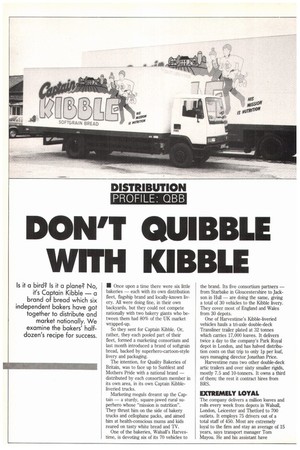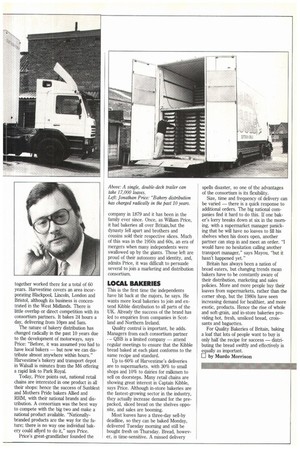DON'T QUIBBLE WITH KIBBLE
Page 50

Page 51

If you've noticed an error in this article please click here to report it so we can fix it.
Is it a bird? Is it a plane? No, it's Captain Kibble — a brand of bread which six independent bakers have got together to distribute and market nationally. We examine the bakers' halfdozen's recipe for success.
• Once upon a time there were six little bakeries — each with its own distribution fleet, flagship brand and locally-known livery. All were doing fine, in their own backyards, but they could not compete nationally with two bakery giants who between them had 80% of the UK market wrapped-up.
So they sent for Captain Kibble. Or, rather, they each pooled part of their fleet, formed a marketing consortium and last month introduced a brand of softgrain bread, backed by superhero-cartoon-style livery and packaging.
The intention, for Quality Bakeries of Britain, was to face up to Sunblest and Mothers Pride with a national brand — distributed by each consortium member in its own area, in its own Captain Kibbleliveried trucks.
Marketing moguls dreamt up the Captain — a sturdy, square-jawed rural superhero whose "mission is nutrition". They thrust him on the side of bakery trucks and cellophane packs, and aimed him at health-conscious mums and kids reared on tasty white bread and TV.
One of the bakeries, Walsall's Harvestime, is devoting six of its 70 vehicles to the brand. Its five consortium partners — from Starbake in Gloucestershire to Jackson in Hull — are doing the same, giving a total of 30 vehicles to the Kibble livery. They cover most of England and Wales from 30 depots.
One of HarvestiMe's Kibble-liveried vehicles hauls a tri-axle double-deck Transliner trailer plated at 32 tonnes which carries 17,000 loaves. It delivers twice a day to the company's Park Royal depot in London, and has halved distribution costs on that trip to only lp per loaf, says managing director Jonathan Price.
Harvestime runs two other double-deck artic trailers and over sixty smaller rigids, mostly 7.5 and 10-tonners. It owns a third of them: the rest it contract hires from BRS.
EXTREMELY LOYAL
The company delivers a million loaves and rolls every week from depots in Walsall, London, Leicester and Thetford to 700 outlets. It employs 75 drivers out of a total staff of 450. Most are extremely loyal to the firm and stay an average 01 15 years, says transport manager Tom Mayou. He and his assistant have together worked there for a total of 60 years. Harvestime covers an area incorporating Blackpool, Lincoln, London and Bristol, although its business is concentrated in the West Midlands. There is little overlap or direct competition with its consortium partners. It bakes 24 hours a day, delivering from lOpm and 5am.
The nature of bakery distribution has changed radically in the past 10 years due to the development of motorways, says Price: "Before, it was assumed you had to have local bakers — but now we can distribute almost anywhere within hours." Harvestime's bakery and transport depot in Walsall is minutes from the M6 offering a rapid link to Park Royal.
Today, Price points out, national retail chains are interested in one product in all their shops: hence the success of Sunblest and Mothers Pride bakers Allied and RHM, with their national brands and distribution. A consortium was the best way to compete with the big two and make a national product available. "Nationallybranded products are the way for the future; there is no way one individual bakery could afford to do it," says Price.
Price's great-grandfather founded the company in 1879 and it has been in the family ever since. Once, as William Price, it had bakeries all over Britain, but the dynasty fell apart and brothers and cousins sold their respective slices. Much of this was in the 1950s and 60s, an era of mergers when many independents were swallowed up by the giants. Those left are proud of their autonomy and identity, and, admits Price, it was difficult to persuade several to join a marketing and distribution consortium.
LOCAL BAKERIES
This is the first time the independents have hit back at the majors, he says. He wants more local bakeries to join and extend Kibble distribution to all parts of the UK. Already the success of the brand has led to enquiries from companies in Scotland and Northern Ireland.
Quality control is important, he adds. Managers from each consortium partner — QBB is a limited company — attend regular meetings to ensure that the Kibble bread baked at each plant conforms to the same recipe and standard.
Up to 60% of Harvestime's deliveries are to supermarkets, with 30% to small shops and 10% to dairies for milkmen to sell on doorsteps. Many retail chains are showing great interest in Captain Kibble, says Price. Although in-store bakeries are the fastest-growing sector in the industry, they actually increase demand for the prepacked, sliced bread on the shelves opposite, and sales are booming.
Most loaves have a three-day sell-by deadline, so they can be baked Monday, delivered Tuesday morning and still be bought fresh on Thursday. Bread, however, is time-sensitive. A missed delivery spells disaster, so one of the advantages of the consortium is its flexibility.
Size, time and frequency of delivery can be varied — there is a quick response to additional orders. The big national companies find it hard to do this. If one baker's lorry breaks down at six in the morning, with a supermarket manager panicking that he will have no loaves to fill his shelves when his doors open, another partner can step in and meet an order. "I would have no hesitation calling another transport manager," says Mayou, "but it hasn't happened yet."
Britain has always been a nation of bread eaters, but changing trends mean bakers have to be constantly aware of their distribution, marketing and sales policies. More and more people buy their loaves from supermarkets, rather than the corner shop, but the 1980s have seen increasing demand for healthier, and more exotic, products. Hence the rise of whole and soft-grain, and in-store bakeries providing hot, fresh, unsliced bread, croissants and baguettes.
For Quality Bakeries of Britain, baking a loaf that lots of people want to buy is only half the recipe for success — distributing the bread swiftly and effectively is equally as important.
by Murdo Morrison
























































































































































